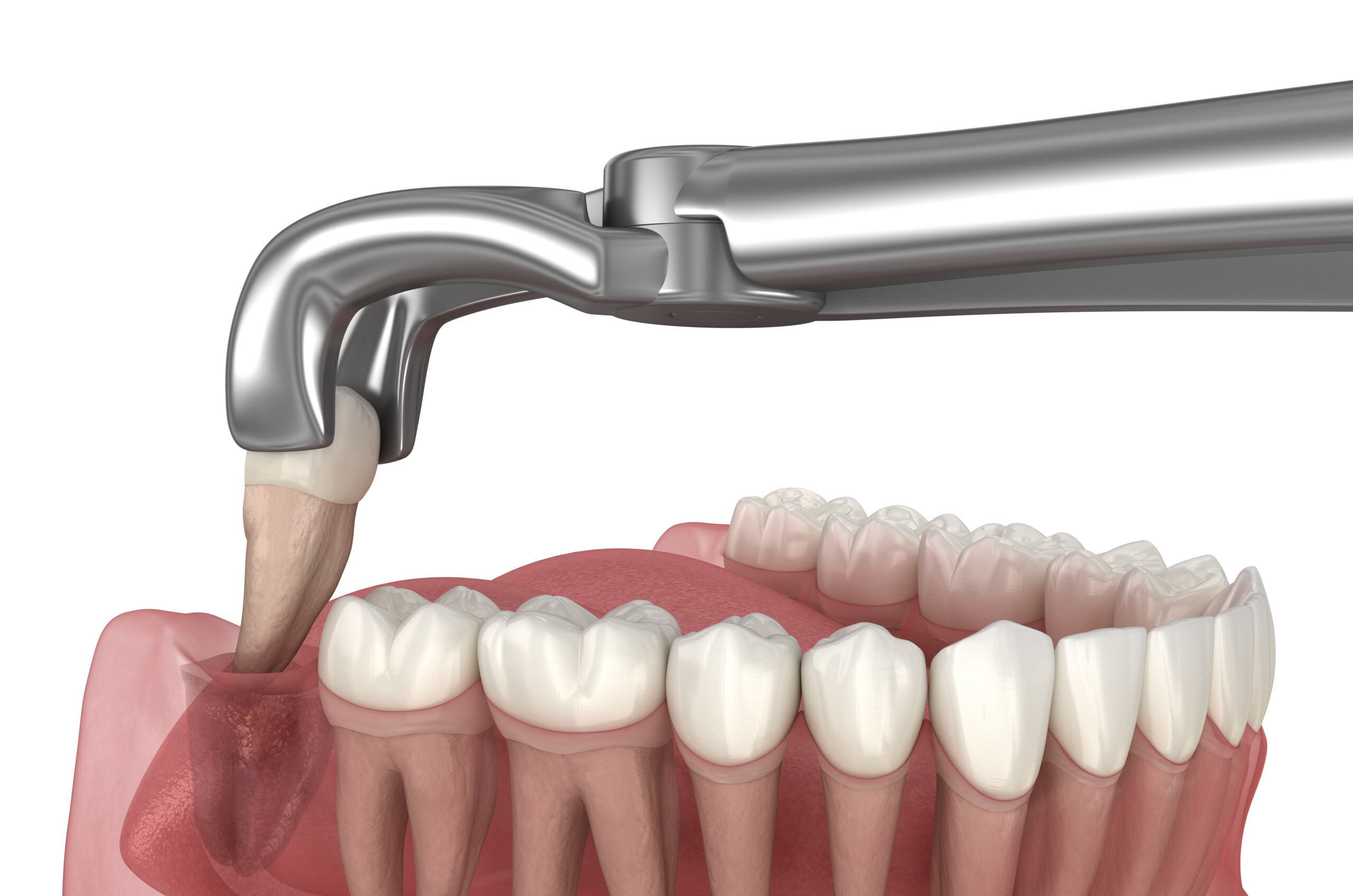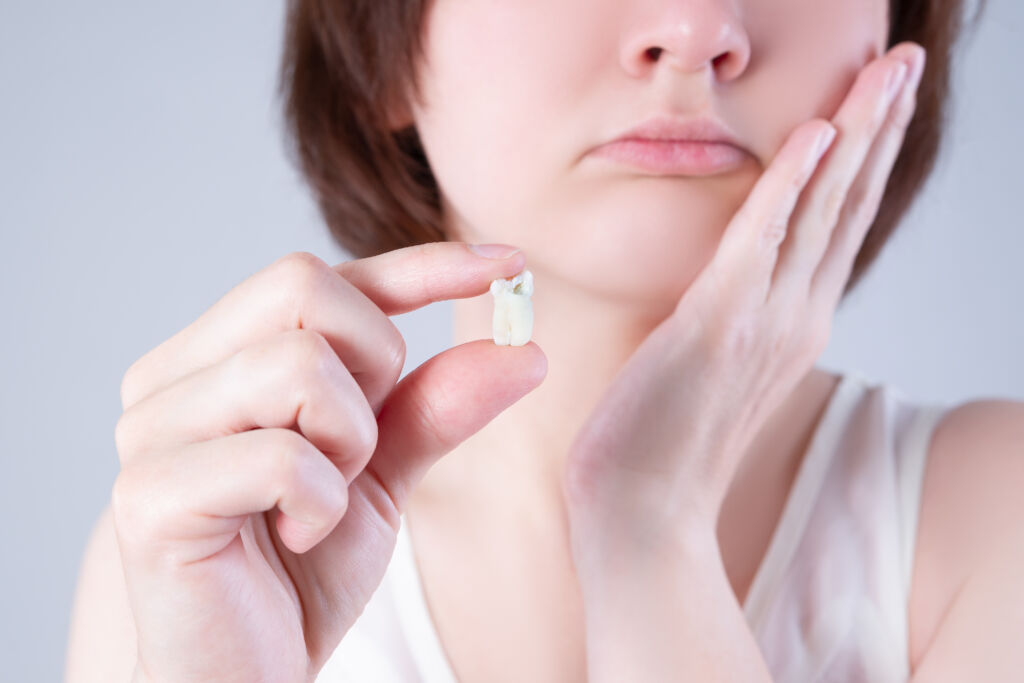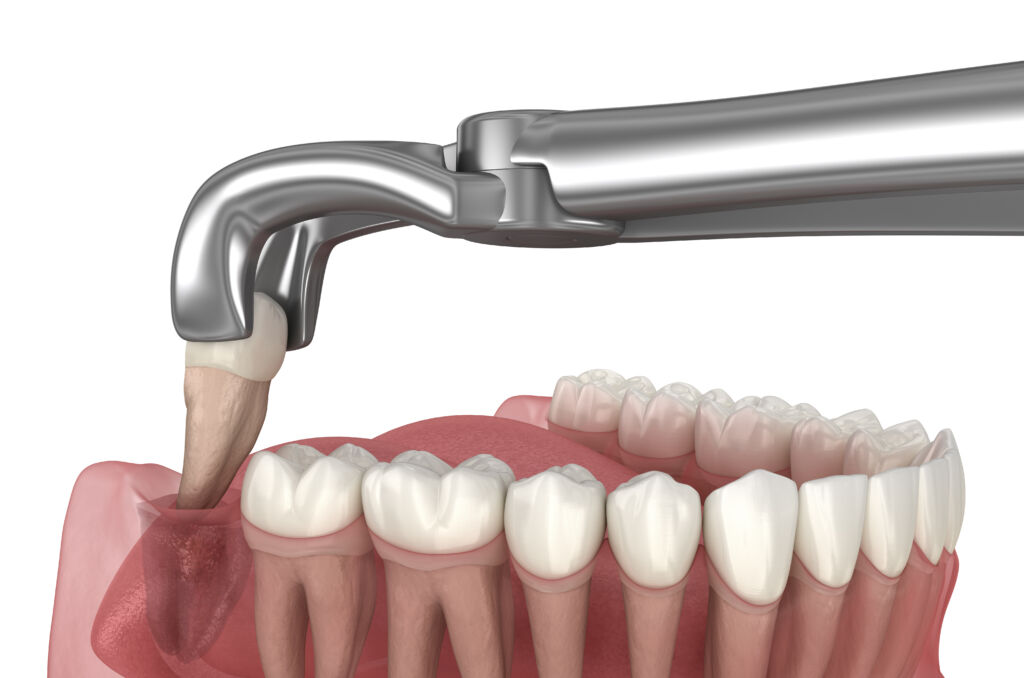Wisdom Tooth Extraction

Wisdom Tooth Extraction In Georgetown
Are your wisdom teeth causing you pain? Mill Street Dental can examine your third molars to determine if extraction is required. In many cases, wisdom teeth must be removed, and we will first assess the condition of your teeth, after which we will discuss why extraction is good if we think that is the good course of action.
What Is A Wisdom Tooth?
These teeth are the upper and lower third molars located in the mouth. They are the last teeth to erupt in the mouth and are referred to as wisdom teeth because they tend to surface when a person is between 17 and 21 years old.
Some patients may keep their wisdom teeth their entire lives, while others must have them removed. We can remove your wisdom teeth before they break through the gums and provide professional advice about your third molars based on your situation. As part of the procedure, we will open up the gum tissue over the tooth and remove any bone covering the tooth if removal is necessary. Once the tissue that connects the tooth to the bone has been separated, the tooth will be removed by the dentist. Depending on the situation, the tooth may need to be cut into smaller pieces to make it easier to extract.
Once the tooth is removed, stitches may be required. Worry not; they will dissolve over time. If they do not, we can remove them for you after a few days.
When is Wisdom Tooth Extraction Necessary?
Wisdom teeth can cause problems so removal may be necessary. Extraction can help correct a problem or prevent problems from arising. The person’s jaw is often not large enough for their wisdom teeth and may become impacted. This means the wisdom teeth cannot break through your gums, causing a big problem.
It’s also possible for wisdom teeth to break through your gums only partly, which can cause a flap of gum tissue to grow over them. Food and germs can become trapped under the flap and cause your gums to become swollen or red, which can be very painful and lead to infection. Serious problems can develop from impacted teeth, like infection, damage to your other teeth and bone or even a cyst.
Additionally, wisdom teeth may come in at an awkward angle, and the top of your tooth can face forward, backward, or to either side.
What to Expect?
A local anesthetic will almost always be used during our extraction procedure, and general anesthetics may be used depending on the situation.
Once wisdom tooth extraction is completed, patients must relax, which will help with the healing process. Physical activity can increase bleeding, and we also ask our patients not to lie flat as this can prolong bleeding. Prop up your head with pillows instead.
When it comes to your diet, you must eat soft foods like soups and pudding. As you start to heal, you can add solid foods to your diet. Do not use a straw for the first few days after the procedure, as sucking on a straw can loosen the blood clot that forms at the surgery site, which can delay healing.
We may prescribe antibiotics if needed, and you must take them as directed. We will also discuss if and when you can restart any medications you were taking before your procedure, and if you require pain medication, you must take them exactly as directed.
Incision Care

You must bite gently on the gauze pad periodically and change pads as they become soaked with blood. If your bleeding does not stop 24 hours after your surgery, call our office. Be careful not to bite the inside of your cheek, lip, or tongue while your mouth is numb and gently rinse your mouth after 24 hours with warm salt water several times a day to reduce swelling and relieve pain. Don’t rinse too hard, which can loosen the blood clot and delay healing.
Try not to rub the area with your tongue, and do not touch it with your fingers. We will also discuss your oral hygiene routine; in most cases, you can continue brushing your teeth and tongue carefully.
You can use an ice pack on the outside of your cheek for the first 24 hours, and you can also use moist heat for the next few days. This can include a face cloth soaked in warm water.
Do not smoke for at least 24 hours after your surgery, as the sucking motion can loosen the clot and delay healing, and it can also decrease your blood supply and may bring germs and contaminants to the surgery area.
Visit Mill Street Dental Studio for Wisdom Tooth Extraction
Wisdom tooth removal is very effective because it can prevent crowding of the back teeth. A wisdom tooth can also become stuck in the jaw and never break through the gums. You may experience red, swollen and painful gums caused by a flap of skin around the wisdom tooth that has only partially erupted. Wisdom tooth removal can help prevent these problems, and it can also help prevent gum disease and tooth decay, which can occur in wisdom teeth because they are harder to clean.
We will discuss all of the advantages and risks of wisdom teeth removal. After the procedure, patients may experience pain and swelling in their gums and tooth sockets where the tooth was removed. Patients can also experience bleeding that won’t stop for 24 hours and difficulty with or pain from opening your jaw. If the protective blood clot is lost too soon, it can result in painful inflammation called a dry socket. While rare, you may experience numbness in your mouth and lips after the local anesthetic wears off due to injury or inflammation of nerves in the jaw.
Any dental surgery can cause bacteria in the mouth to enter the bloodstream and cause infection in other parts of the body, but this is rare. Our dentist has years of experience and training with dental procedures. You can rest assured you are in good hands when you visit Mill Street Dental Studio.
Is Wisdom Tooth Extraction Mandatory?
The removal of wisdom teeth is not always necessary. We will complete a thorough examination of your mouth before we provide you with this information. Wisdom tooth extraction can be avoided if your wisdom teeth are healthy or have erupted fully. This procedure can also be avoided if your wisdom teeth are positioned correctly and do not interfere with your bite. If you can reach your wisdom teeth when brushing and flossing and properly complete your oral hygiene routine, this common oral surgery may not be needed.
Attending your regular dental appointments at our office will allow our dentist to monitor the growth and emergence of your wisdom teeth, and we will decide when and if extraction is necessary. We may request regularly updated dental X-rays as this can indicate impacted wisdom teeth before any symptoms develop. We will continue to monitor your wisdom teeth during routine exams to ensure they are healthy.
Do you have questions or concerns regarding your wisdom teeth? Our team is always ready to help, and we will provide you with the right information.
If we see that your wisdom teeth are affecting the rest of your teeth, your wisdom teeth will need to be removed, and this can happen when these teeth do not have enough space and erupt at odd angles. If your wisdom teeth remain below the gums, this is another reason why they may need to be removed, as they can lead to infection or even damage the roots of your other teeth.
If your wisdom teeth only erupt partially or erupt fully but grow at an angle, they should be removed because this will make them harder to clean and prone to infection and may cause damage to other teeth.
If you’re unsure whether your wisdom teeth need to be removed, you can schedule an appointment with us anytime. Our dentist here in Georgetown will provide you with the right information. Pain is usually the first telltale sign that it’s time to have your wisdom teeth removed, and other symptoms include recurring infection in the soft tissue, damage to neighbouring teeth and gum disease.
We recommend removing your wisdom teeth as a teen or young adult because these teeth are easier to remove when a patient is young, and the jaw will heal more quickly.
If you are looking for a reputable dentist near you in Georgetown, call us today! We will tell you exactly what you can expect from this procedure and will provide you with pain medication and antibiotics to prevent infection following your surgery. Most patients can return to normal activities after a few days of rest.
If you are in need of an emergency dentist near you or want to schedule an appointment with a great Georgetown dentistry clinic, contact us today!
Wisdom Tooth Extraction In Georgetown
Are your wisdom teeth causing you pain? Mill Street Dental can examine your third molars to determine if extraction is required. In many cases, wisdom teeth must be removed, and we will first assess the condition of your teeth, after which we will discuss why extraction is good if we think that is the course of action.
What Is A Wisdom Tooth?

These teeth are the upper and lower third molars located in the mouth. They are the last teeth to erupt in the mouth and are referred to as wisdom teeth because they tend to surface when a person is between 17 and 21 years old.
Some patients may keep their wisdom teeth their entire lives, while others must have them removed. We can remove your wisdom teeth before they break through the gums and provide professional advice about your third molars based on your situation. As part of the procedure, we will open up the gum tissue over the tooth and remove any bone covering the tooth if removal is necessary. Once the tissue that connects the tooth to the bone has been separated, the tooth will be removed by the dentist. Depending on the situation, the tooth may need to be cut into smaller pieces to make it easier to extract.
When is Wisdom Tooth Extraction Necessary?
Wisdom teeth can cause problems so removal may be necessary. Extraction can help correct a problem or prevent problems from arising. The person’s jaw is often not large enough for their wisdom teeth and may become impacted. This means the wisdom teeth cannot break through your gums, causing a big problem.
It’s also possible for wisdom teeth to break through your gums only partly, which can cause a flap of gum tissue to grow over them. Food and germs can become trapped under the flap and cause your gums to become swollen or red, which can be very painful and lead to infection. Serious problems can develop from impacted teeth, like infection, damage to your other teeth and bone or even a cyst.
Additionally, wisdom teeth may come in at an awkward angle, and the top of your tooth can face forward, backward, or to either side.
What to Expect?

A local anesthetic will almost always be used during our extraction procedure, and general anesthetics may be used depending on the situation.
Once wisdom tooth extraction is completed, patients must relax, which will help with the healing process. Physical activity can increase bleeding, and we also ask our patients not to lie flat as this can prolong bleeding. Prop up your head with pillows instead.
When it comes to your diet, you must eat soft foods like soups and pudding. As you start to heal, you can add solid foods to your diet. Do not use a straw for the first few days after the procedure, as sucking on a straw can loosen the blood clot that forms at the surgery site, which can delay healing.
We may prescribe antibiotics if needed, and you must take them as directed. We will also discuss if and when you can restart any medications you were taking before your procedure, and if you require pain medication, you must take them exactly as directed.
Incision Care
You must bite gently on the gauze pad periodically and change pads as they become soaked with blood. If your bleeding does not stop 24 hours after your surgery, call our office. Be careful not to bite the inside of your cheek, lip, or tongue while your mouth is numb and gently rinse your mouth after 24 hours with warm salt water several times a day to reduce swelling and relieve pain. Don’t rinse too hard, which can loosen the blood clot and delay healing.
Try not to rub the area with your tongue, and do not touch it with your fingers. We will also discuss your oral hygiene routine; in most cases, you can continue brushing your teeth and tongue carefully.
You can use an ice pack on the outside of your cheek for the first 24 hours, and you can also use moist heat for the next few days. This can include a face cloth soaked in warm water.
Do not smoke for at least 24 hours after your surgery, as the sucking motion can loosen the clot and delay healing, and it can also decrease your blood supply and may bring germs and contaminants to the surgery area.
Visit Mill Street Dental Studio for Wisdom Tooth Extraction
Wisdom tooth removal is very effective because it can prevent crowding of the back teeth. A wisdom tooth can also become stuck in the jaw and never break through the gums. You may experience red, swollen and painful gums caused by a flap of skin around the wisdom tooth that has only partially erupted. Wisdom tooth removal can help prevent these problems, and it can also help prevent gum disease and tooth decay, which can occur in wisdom teeth because they are harder to clean.
We will discuss all of the advantages and risks of wisdom teeth removal. After the procedure, patients may experience pain and swelling in their gums and tooth sockets where the tooth was removed. Patients can also experience bleeding that won’t stop for 24 hours and difficulty with or pain from opening your jaw. If the protective blood clot is lost too soon, it can result in painful inflammation called a dry socket. While rare, you may experience numbness in your mouth and lips after the local anesthetic wears off due to injury or inflammation of nerves in the jaw.
Any dental surgery can cause bacteria in the mouth to enter the bloodstream and cause infection in other parts of the body, but this is rare. Our dentist has years of experience and training with dental procedures. You can rest assured you are in good hands when you visit Mill Street Dental Studio.
Is Wisdom Tooth Extraction Mandatory?
The removal of wisdom teeth is not always necessary. We will complete a thorough examination of your mouth before we provide you with this information. Wisdom tooth extraction can be avoided if your wisdom teeth are healthy or have erupted fully. This procedure can also be avoided if your wisdom teeth are positioned correctly and do not interfere with your bite. If you can reach your wisdom teeth when brushing and flossing and properly complete your oral hygiene routine, this common oral surgery may not be needed.
Attending your regular dental appointments at our office will allow our dentist to monitor the growth and emergence of your wisdom teeth, and we will decide when and if extraction is necessary. We may request regularly updated dental X-rays as this can indicate impacted wisdom teeth before any symptoms develop. We will continue to monitor your wisdom teeth during routine exams to ensure they are healthy.
Do you have questions or concerns regarding your wisdom teeth? Our team is always ready to help, and we will provide you with the right information.
If we see that your wisdom teeth are affecting the rest of your teeth, your wisdom teeth will need to be removed, and this can happen when these teeth do not have enough space and erupt at odd angles. If your wisdom teeth remain below the gums, this is another reason why they may need to be removed, as they can lead to infection or even damage the roots of your other teeth.
If your wisdom teeth only erupt partially or erupt fully but grow at an angle, they should be removed because this will make them harder to clean and prone to infection and may cause damage to other teeth.
If you’re unsure whether your wisdom teeth need to be removed, you can schedule an appointment with us anytime. Our dentist here in Georgetown will provide you with the right information. Pain is usually the first telltale sign that it’s time to have your wisdom teeth removed, and other symptoms include recurring infection in the soft tissue, damage to neighbouring teeth and gum disease.
We recommend removing your wisdom teeth as a teen or young adult because these teeth are easier to remove when a patient is young, and the jaw will heal more quickly.
If you are looking for a reputable dentist near you in Georgetown, call us today! We will tell you exactly what you can expect from this procedure and will provide you with pain medication and antibiotics to prevent infection following your surgery. Most patients can return to normal activities after a few days of rest.
If you are in need of an emergency dentist near you or want to schedule an appointment with a great Georgetown dentistry clinic, contact us today!
